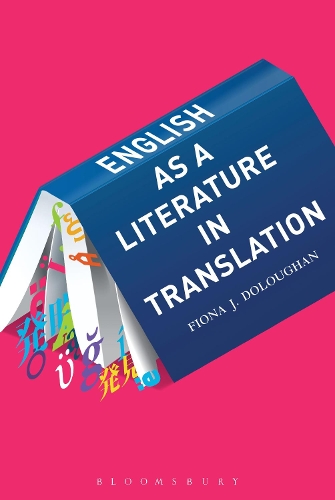
English as a Literature in Translation
(Paperback)
Available Formats
Publishing Details
English as a Literature in Translation
By (Author) Dr Fiona J. Doloughan
Bloomsbury Publishing PLC
Bloomsbury Academic USA
18th May 2017
United States
Classifications
Tertiary Education
Non Fiction
Translation and language interpretation
418.04
Physical Properties
Paperback
192
Width 152mm, Height 229mm
263g
Description
For many writers writing in English today, English is but one of a number of languages, and by extension cultures, to which they have access. The question arises of the impact of this sometimes latent, sometimes explicit, multilingualism on generic and other literary forms and conventions. To what extent is English literature today a literature in translation in the sense that it is formed at the confluence of different literary and cultural traditions and is mediated or brokered by multilingual individuals And to what extent might literary creativity today be premised on access to more than one language and/or set of cultural and literary traditions English as a Literature in Translation examines the complexities of writing in English and assesses the extent to which language practices in English have been localized and/or culturally inflected, even as English has become a global medium of communication.
Reviews
This well-written book explores contemporary literature in English by multilingual authors who reflect linguistic and cultural diversity. Doloughan (Open Univ., UK) illustrates their translating and mediating role by analyzing such key texts as Polish-born Eva Hoffman's Lost in Translation (1989), Chilean Ariel Dorfman's play Death and the Maiden (1991), and Texan Gloria Anzalda's Borderlands (1987). Including James Kelman's Translated Accounts (2001) here is amply justified, since his idiomatic expression, informed by working-class roots and a Scottish dialect, deviates enough from the norm to require some translation by the reader. The most interesting case study deals with, among other texts, A Concise Chinese-English Dictionary for Lovers (2008) by the incredibly prolific multilingual author and filmmaker Xiaolu Guo (b. 1973), who presently lives in London. Doloughan briefly acknowledges that Guo also uses visual language as a medium but seems to ignore its full importance: Guo dedicated the award-winning 2011 film adaptation of her novel UFO in Her Eyes (2009) to Mikhail Kalatozov and his 1964 film Soy Cuba. Guo's latest novel, I Am China (2014), is an exact translation of this very title. Similarly, Guo pays homage to Jean-Luc Godard's 1967 film La Chinoise with her films She, a Chinese and Once upon a Time Proletarian (both 2009). Summing Up: Recommended. Graduate students, researchers, faculty. * CHOICE *
[This study] make[s] valuable contributions to the study of English literature in its broadest sense by reappraising in cognitive, hermeneutic, and aesthetic terms a wide range of heterolingual writing. * Translation & Literature *
No languagecertainly not the hybrid, motley creature that English has evolved intoexists in sovereign isolation. Challenging the linguaphobia and xenophobia that has infected political discourse in the United Kingdom and the United States, Fiona J. Doloughan offers an invigorating reading of English in the presence of and creative symbiosis with other languages. Through careful, insightful analyses of narratives of translation by Eva Hoffman, Xiaolu Guo, Ariel Dorfman, James Kelman, Gloria Anzalda, and Sandra Cisneros, Doloughan makes an important contribution to comparative literature, translation and translingual studies, and applied linguistics. English as a Literature in Translation demands a fresh perspective not only on those authors but on conventional notions of text, context, and national identity. * Steven G. Kellman, Professor of Comparative Literature, University of Texas at San Antonio, USA, and author of The Translingual Imagination (2000) *
This is a timely and important book that highlights the ways in which contemporary writers in English are engaging with translation and multilingualism. Fiona Doloughan investigates the changing linguistic landscape in the English-speaking world and shows the extent to which writing today is grounded in different notions of translation. * Susan Bassnett, Professor of Comparative Literature, University of Warwick and University of Glasgow, UK *
Where English is not the world's first language, it is the second of choice. Any non-anglophone author will seek an English translation of their books. Yet in London's primary schools over 340 diverse languages are spoken, almost none of which are taught in the rapidly-declining field of "Foreign" Languages. Are overseas writers seeking English publication adapting to the restricted vocabulary of Globish Or is global English being refreshed by the multiple inflections of local idioms and international street slang Fiona J. Doloughan examines pluringual Britain and celebrates the emergence of a new literature that mixes genres and crosses borders. Part fresh research, part a long overdue theoretical review of what we read, write and say, her voice speaks for contemporary Britain. * Amanda Hopkinson, Visiting Professor in Literary Translation, City University London, UK, and Visiting Professor at the Centre for Translation and Intercultural Studies, Manchester University, UK, author of A History of Photography in Mexico, and translator from Spanish, Portuguese, and French *
Author Bio
Fiona J. Doloughan is Lecturer in English at The Open University, UK.
